Today I’ve invited Laura Libricz, author of The Soldier’s Return, the second book in the Heaven’s Pond trilogy to Ascroft, eh? to tell us about her latest novel.
Welcome Laura.
Thank you so much for having me over today, Dianne!
Let’s get started, shall we?
Tell us about your novel.
LL: The Heaven’s Pond Series is a three-part historical series set in Franconia, Germany, in the early 17th  century during the Thirty Years War. These are the novels I have always wanted to read. Written in English and taking the German viewpoint of the war, the story is told by a young maid, a patrician, a Jesuit priest and a young Dutchman. The Master and the Maid is the first book in the series and begins the story in 1616. It’s about a young woman who loses her home, her job and her freedom. Harboring a mysterious newborn, she could lose her life. The Soldier’s Return is the second novel in the series. The year is 1626 and mercenary soldiers terrorize the countryside. A church-run witch hunt rages as well. Can three unlikely companions unite to survive? The third book, Ash and Rubble, is in the early revision stages. The year is 1632 and the Protestant city of Nuremberg is besieged by the estimated 150,000-man-strong Swedish army comprised of soldiers and camp followers, under the command of the Swedish king, Gustav II Adolf. The child of the first two books is now 16 and living in Nuremberg. Will she escape the besieged city and leave those she loves behind? This is the series climax.
century during the Thirty Years War. These are the novels I have always wanted to read. Written in English and taking the German viewpoint of the war, the story is told by a young maid, a patrician, a Jesuit priest and a young Dutchman. The Master and the Maid is the first book in the series and begins the story in 1616. It’s about a young woman who loses her home, her job and her freedom. Harboring a mysterious newborn, she could lose her life. The Soldier’s Return is the second novel in the series. The year is 1626 and mercenary soldiers terrorize the countryside. A church-run witch hunt rages as well. Can three unlikely companions unite to survive? The third book, Ash and Rubble, is in the early revision stages. The year is 1632 and the Protestant city of Nuremberg is besieged by the estimated 150,000-man-strong Swedish army comprised of soldiers and camp followers, under the command of the Swedish king, Gustav II Adolf. The child of the first two books is now 16 and living in Nuremberg. Will she escape the besieged city and leave those she loves behind? This is the series climax.
What prompted you to write about this historical event? How closely did you stick to the historical facts? If you used them loosely, how did you decide whether to deviate from them?
LL: I originally wanted to write about the Sichardtshof farm, an abandoned hamlet in Franconia, Germany. As I researched the area, I realized how deeply the Thirty Years War shaped South Germany. The area was almost completely devoid of people after the war. It took generations to bounce back, too. The more information I uncovered, the more my interest in this time period grew. Yes, the books are formed around recorded historical events. If the weather was bad, I wrote that into the story. If troops were invading, I wrote that in. If a General and his entourage were in town, I wrote that in as well. This was very important to me. I wanted this project to be a tribute to the people who lived and died at that time and I wanted to bring this alive for an English speaking audience who may not have access to the historical archives because of language or location barriers. I’ve listed a bibliography on my website for those who’d like to do more reading.
Of course, some deviation is necessary. I don’t believe that all historical records are accurate. We must take into consideration who was doing the recording. If the church fathers were recording the events, it will be to the benefit of the church and their Christian beliefs. Those that I find most interesting, common people and women, for example, have not had a fair voice. I wanted to give them a voice.
What research did you do for this book?
LL: I began my research for this project in 2009 and am still researching today. What started as a mild interest expanded into a full blown obsession. My favorite research materials are the Heimatsbücher, the local histories put together by local historians using council records, old deeds and street plans, old Salbücher, tax records. The research is ongoing. The third book taking place during the siege of Nuremberg and because this event is well-documented, I want to get it right.
Do you use a mixture of historic figures and invented characters in the novel? Which is more difficult to write? Which to you prefer to write and why?
LL: I use historical figures in my novels but I like to concentrate on invented characters. Historical figures are much more difficult for me to write because they are already famous so most readers already have their opinions about them. I find the lesser-knowns more interesting and they need me to be their voice. These are the people who really lived, that really suffered, those that had real-life issues. Kings and queens were kings and queens. Surely, enough praises have been sung!
In an historical novel you must vividly re-create a place and people in a bygone era. How did you bring the place and people you are writing about to life?
LL: All you have to do to even get a small taste of what it was like to live in a bygone era is to live without central heating for a spell. To deepen the experience, take away the gas stove and the dishwasher, turn off all the electricity and stop shopping for two weeks. Slaughter some chickens and rabbits, get on the back of a horse, collect wood for that insatiable fire. There’s no running water? Fetch some water from the well before you go to bed otherwise you have to go out in the morning. This was the backdrop of my characters’ days. For the love of the story, these tasks must take a back seat but they are ever-present, life sustaining realities.
There often seems to be more scope in historical novels for male characters rather than female characters. Do you prefer to write one sex or the other? And, if so, why?
LL: I always thought that most novels were written from a female perspective so I did some surfing around after I read this question and it seems like this isn’t the case. I like to write from both perspectives. I like one as much as the other. I am very aware of cliched roles for men and women and I try to avoid this as much as I can. My characters are based on decisions I would make or people I know would make in similar circumstances. I don’t think people’s motivations have changed much over the years. We have the same urges and the same needs. Having said that, values have changed over the years. For example, family values, like the nuclear family, are a recent phenomenon and children were not always seen as an asset in 17th century Germany.
Thanks for answering my questions in such interesting detail, Laura, and good luck with your series.
For more information about Laura Libricz please visit her website and blog. Readers can also connect with her on Facebook, Twitter, Google+, YouTube, Instagram, Pinterest, LinkedIn, and Goodreads.
The Soldier’s Return is available online at the following retailers:
Amazon | Barnes and Noble | IndieBound
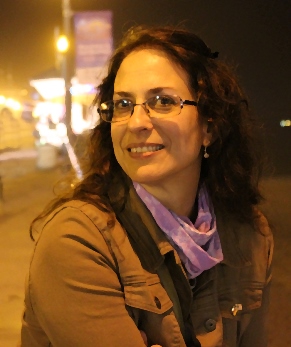 About Laura Libricz: She was born and raised in Bethlehem PA and moved to Upstate New York when she was 22. After working a few years building Steinberger guitars, she received a scholarship to go to college. She tried to ‘do the right thing’ and study something useful, but spent all her time reading German literature. She earned a BA in German at The College of New Paltz, NY in 1991 and moved to Germany, where she resides today. When she isn’t writing she can be found sifting through city archives, picking through castle ruins or aiding the steady flood of musical instruments into the world market.
About Laura Libricz: She was born and raised in Bethlehem PA and moved to Upstate New York when she was 22. After working a few years building Steinberger guitars, she received a scholarship to go to college. She tried to ‘do the right thing’ and study something useful, but spent all her time reading German literature. She earned a BA in German at The College of New Paltz, NY in 1991 and moved to Germany, where she resides today. When she isn’t writing she can be found sifting through city archives, picking through castle ruins or aiding the steady flood of musical instruments into the world market.
Her first novel, The Master and the Maid, is the first book of the Heaven’s Pond Trilogy. The Soldier’s Return and Ash and Rubble are the second and third books in the series.

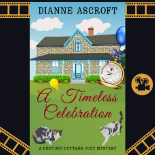




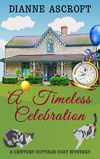

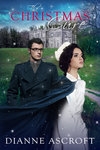
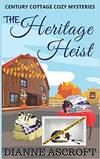
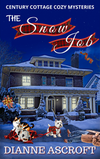
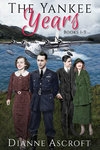

It was a pleasure to be here today, Dianne! Thank you.
Reblogged this on Laura Libricz, Authoress and commented:
Today, I’m over at Dianne Ascroft’s blog for an interview! Read more here: